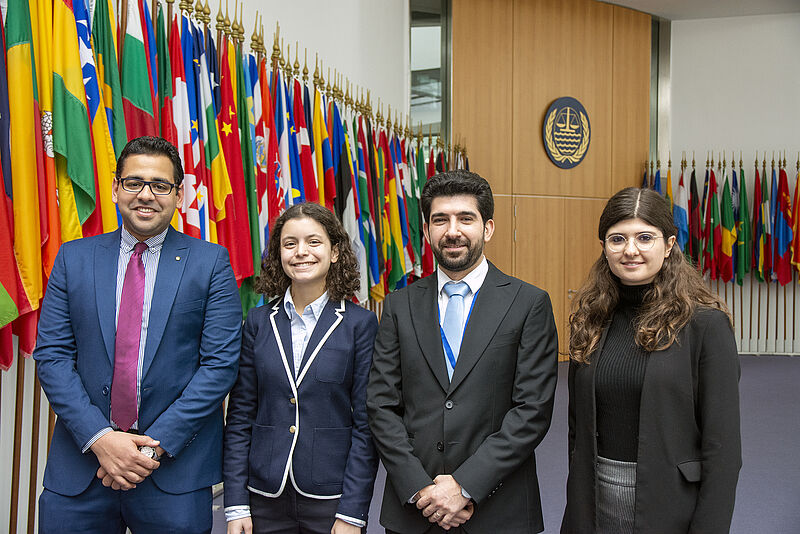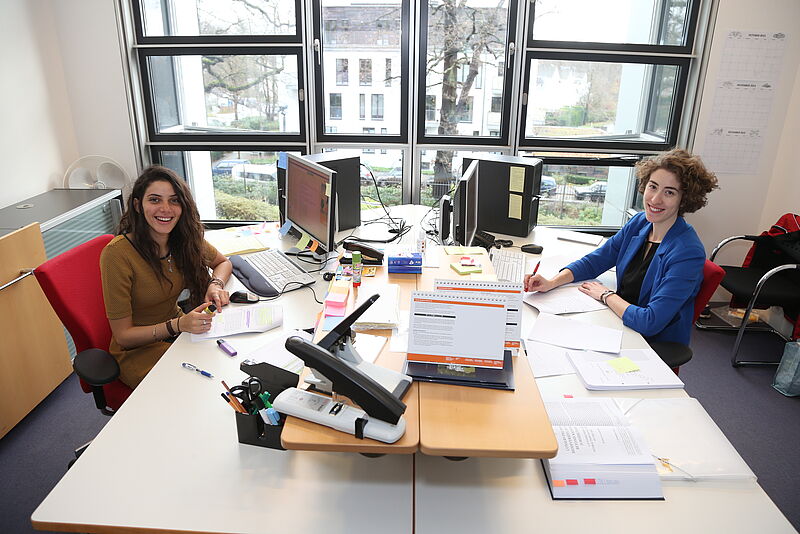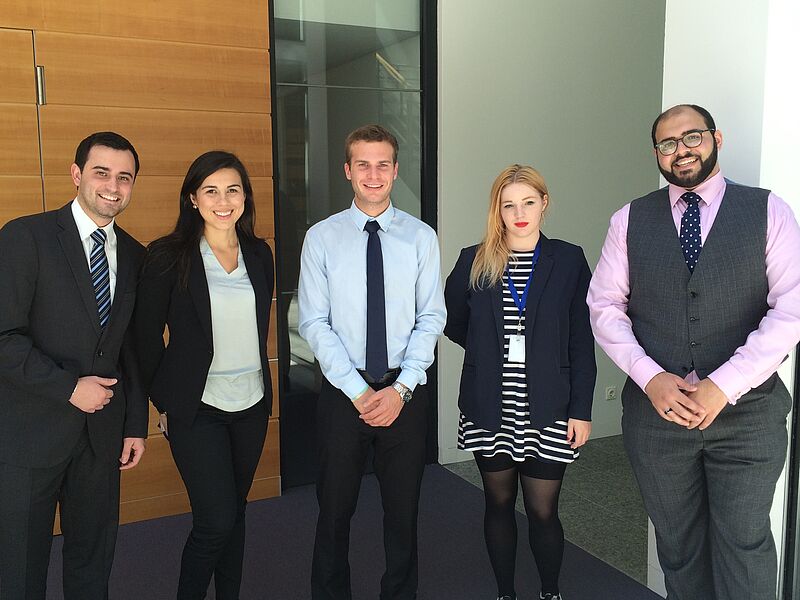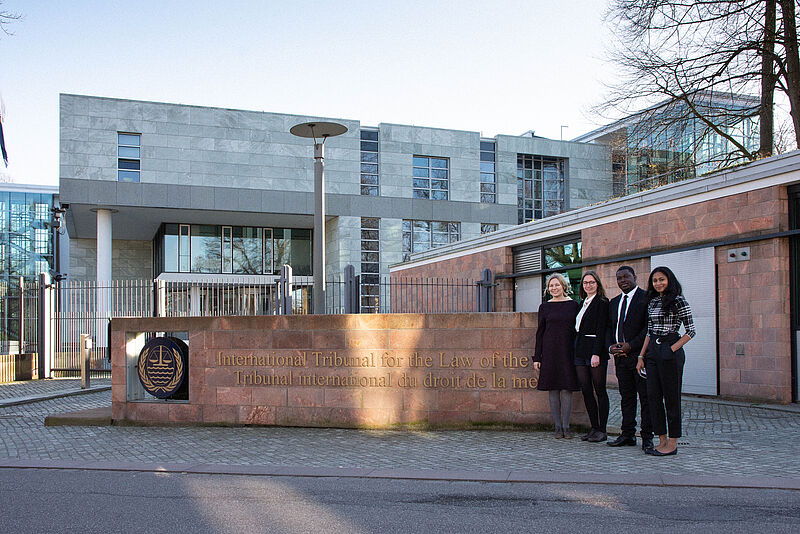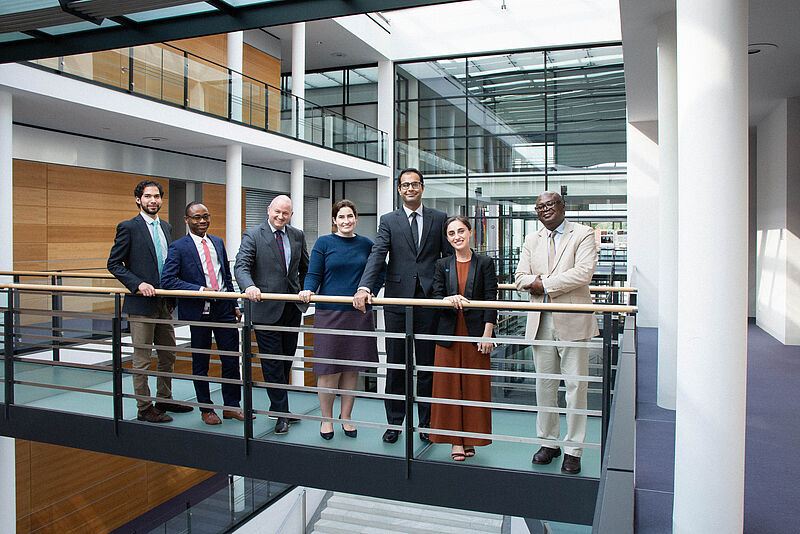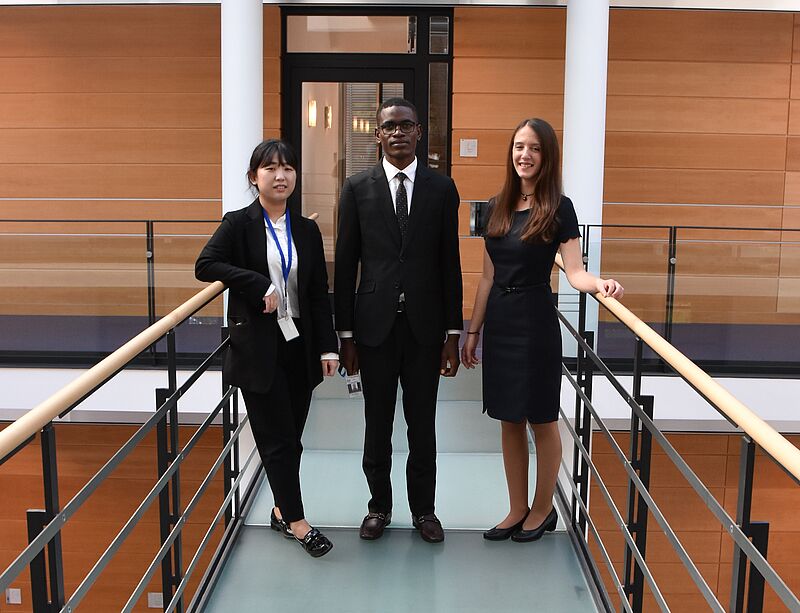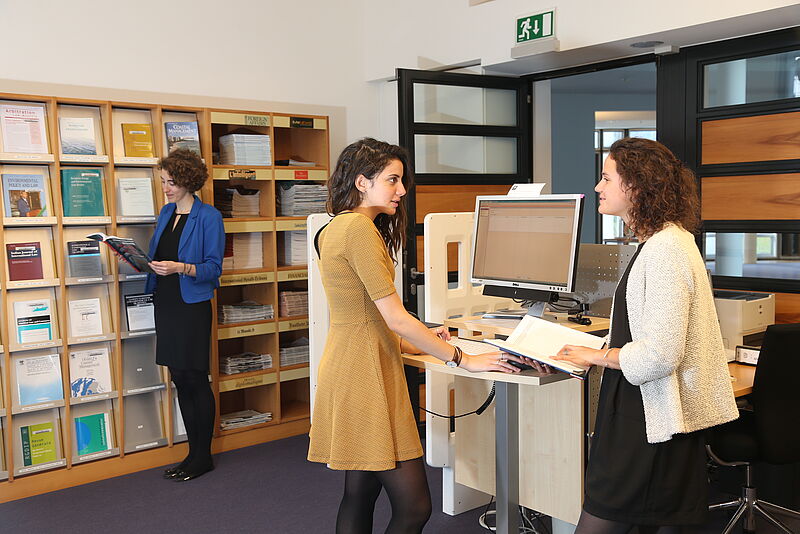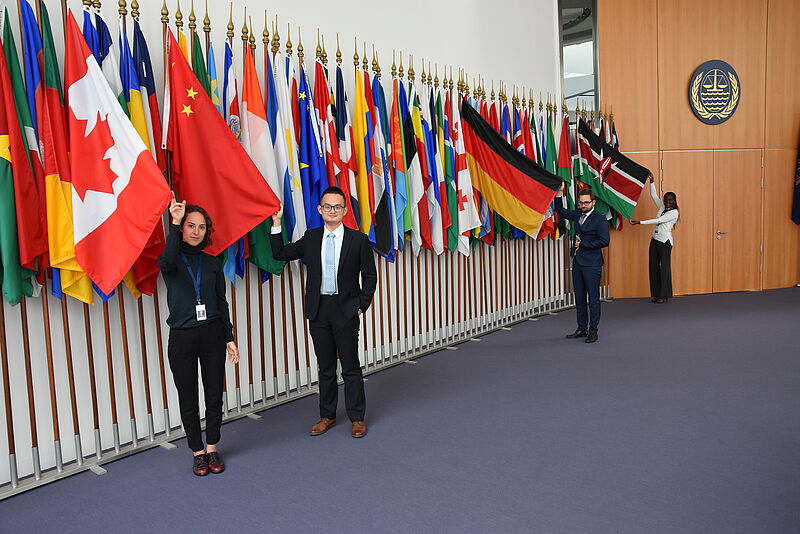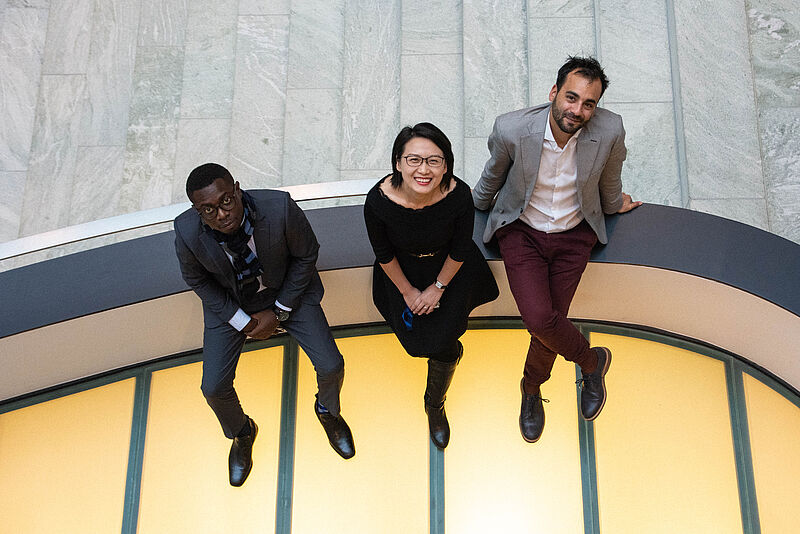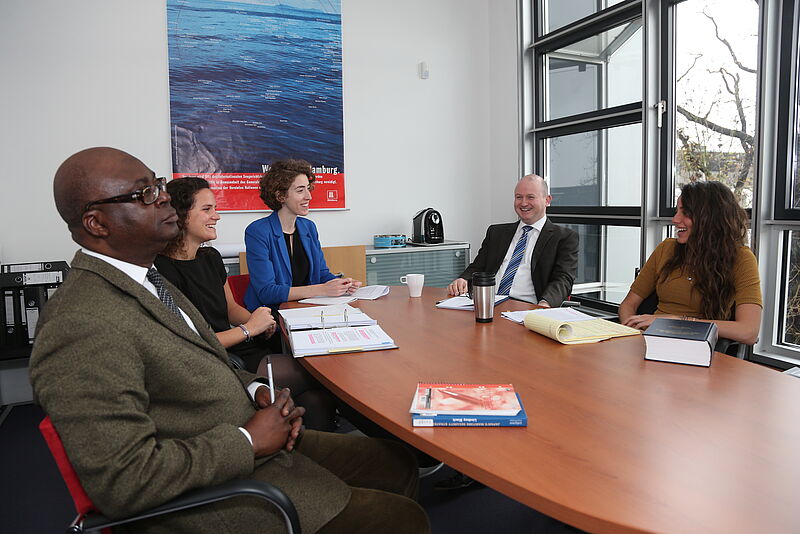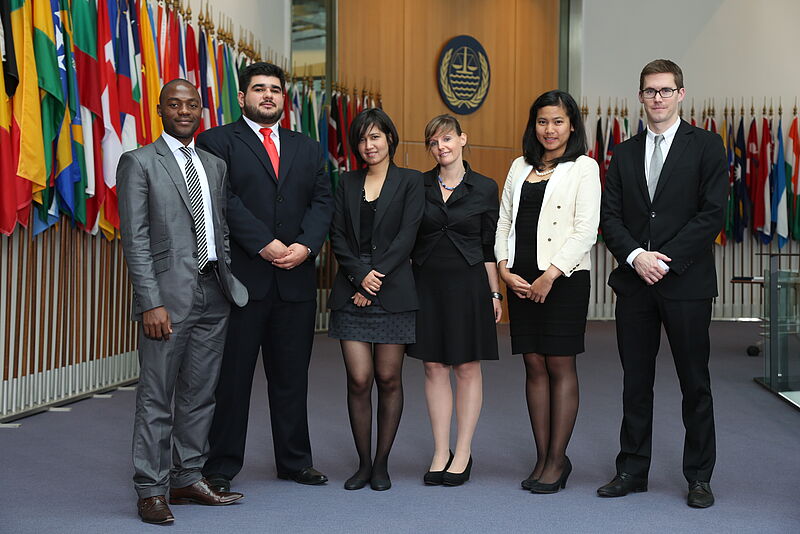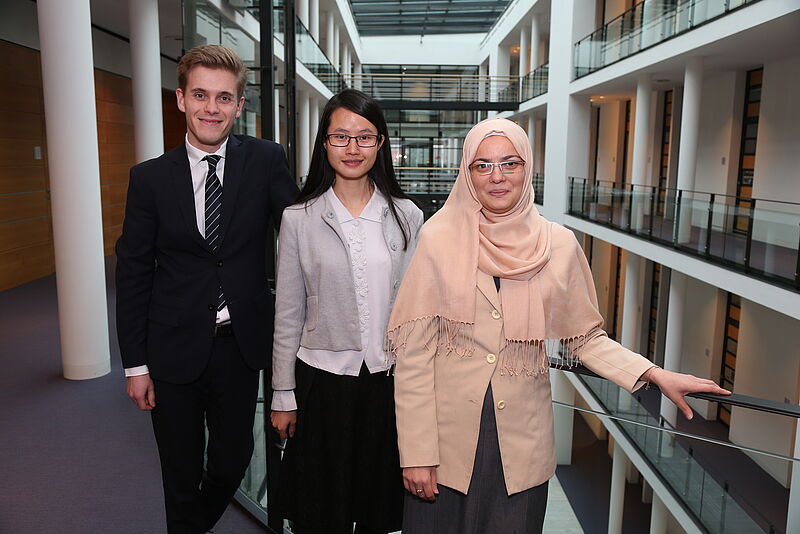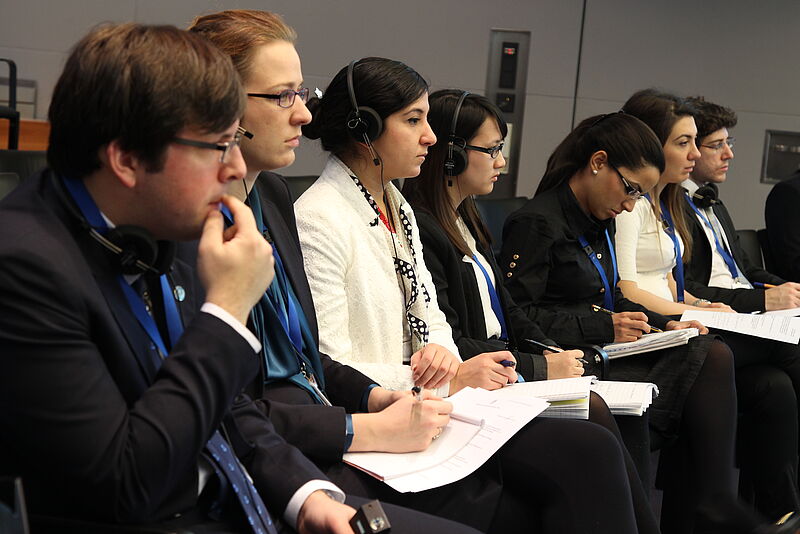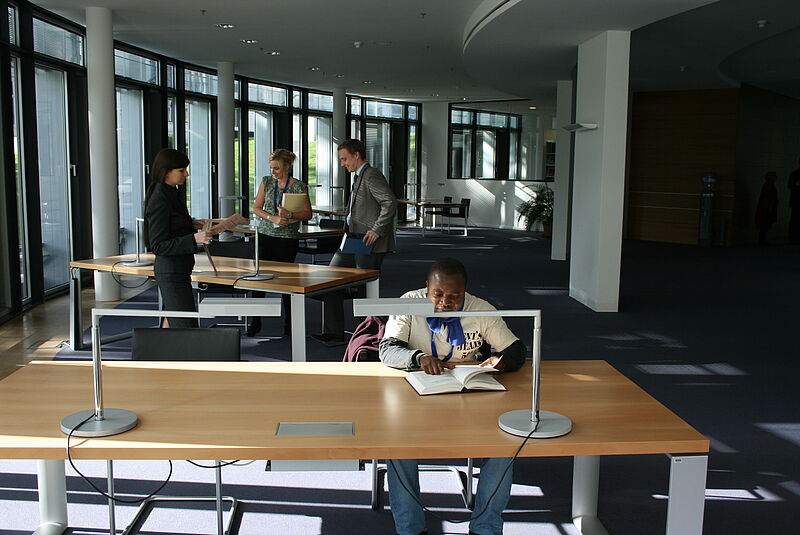Internship Programme
The Tribunal offers a limited number of internships each year to students and recent graduates of law, international relations, public relations, political science, library science and translation. Interns work under the supervision of Registry officials on matters relevant to the Tribunal’s work. The three-month programme allows students to gain an understanding of the way in which the Tribunal functions and to participate in the work of the Registry. Interns are expected to be able to contribute to the work of the Tribunal in fields such as the law of the sea, public international law, international organizations and international relations, political science, public information, library science and translation.
The application period for the internship period July to September 2026 is currently open, with an application deadline of 31 December 2025.
Applications for internship periods after this date may also be submitted.
The following criteria are used to determine eligibility for the internship programme:
Applicants should:
- have completed at least three years of university studies;
- normally be engaged in a degree-granting or postgraduate course at the time of application and also during their internship, or be a recent graduate;
- normally not be more than 32 years of age;
- have a good command of English and/or French; and
- have an interest in international law, in particular international law of the sea, international affairs or international institutions and organizations.
Why an internship with the Tribunal?
If you are considering a career in international law, for example, whether working for a law firm, an international or regional organization or your national government, and if you are interested in a behind-the-scenes experience at an international court, then you are in the right place. Working closely with officials in the Tribunal's Registry, interns have the chance to experience the daily routine of the Registry's different departments, interact with members of the Tribunal, use the extensive library facilities for their research, meet participants of other training programmes and enjoy the challenge of working in a truly international environment. An internship at the Tribunal provides students and recent graduates with a once-in-a-lifetime experience.
Come and join us!
Can I be an intern at the Tribunal?
The following criteria are used to determine eligibility for the internship programme:
Applicants should:
- have completed at least three years of university studies;
- normally be engaged in a degree-granting or postgraduate course at the time of application and also during their internship, or be a recent graduate;
- normally not be more than 32 years of age;
- have a good command of English and/or French; and
- have an interest in international law, in particular international law of the sea, international affairs or international institutions and organizations.
Our interns are students or recent graduates from all over the world, all sharing an interest in international law and in particular the law of the sea. Their backgrounds are varied and depend on the department they are attached to: those in the Legal Office have usually completed their first law degree or are already working on a masters in international law or a PhD in a law of the sea-related topic. Library interns should be enrolled in a library science or archival administration course, and interns with Linguistic Services should be enrolled in a translation degree course and be able to work in the two official languages. Press Office interns tend to be students of journalism, media studies or international relations.
In the selection of candidates due consideration is given to geographical diversity and gender balance.
What does an internship entail?
Under the supervision of a Registry staff member, interns carry out assignments for the Registry. Internships are available in the following departments:
Legal Office
The Legal Office consists of four legal officers, working under the supervision of the Head of the Legal Office. The Legal Office works in close cooperation with the Registrar, conducting research on international law, law of the sea and administrative legal matters; examining legal instruments and precedents relating to the work of the Tribunal; drafting judicial reports on questions relating to the work of the Tribunal; serving the meetings of the Tribunal and preparing background material, reports and papers; and providing legal advice on a diverse range of substantive and procedural questions of law as well as on the management and administration of the Registry.
Tasks involved:
- Interns work under the close supervision of one of the legal officers. They carry out research on a variety of legal issues and prepare notes for their supervisor, the other legal officers, or the Registrar.
- Interns are also requested to conduct research on a specific topic of their own choice, upon which they prepare a written paper and give an oral presentation to the Legal Office at the end of the internship.
- Together with other interns serving at the Tribunal, they also prepare the weekly press review covering recent developments in the law of the sea.
Library and Archives
The Library maintains and develops a specialized collection of resources on the law of the sea and public international law with approximately 8,500 monographic titles and over 500 serial titles. It is run by the Head of Library and Archives, who is supported by the associate archivist and the library assistant. The Archives department processes judicial, session, and administrative records and administers the Electronic Document Management System and ITLOS Departmental Archival Database.
Tasks involved:
Library interns assist the Library staff in their day-to-day operations. This includes activities related to acquisitions, cataloguing, database maintenance, collection management support, document processing, compilation of bibliographies and managing electronic resources. They also assist Library users with law library technology.
Linguistic Services
Linguistic Services deal with the translation and revision of legal and judicial texts, administrative documents and other texts, from English into French and vice versa. The Head of Linguistic Services is supported by a team of one translator-reviser, one translator and two linguistic assistants. During cases and administrative and judicial sessions they are joined by interpreters, revisers, translators and verbatim reporters.
Tasks involved:
Interns are involved in translation and document preparation, referencing and research, text alignment for the translation memory system, database management of official documents for reference and archival purposes, terminological research, and the compilation of glossaries and databases.
Press Office
The Press Office serves as the focal point for public information activities for the Tribunal. Press Office tasks include: drafting and disseminating press releases; preparing information material for presentations, events and social media portals; managing the Tribunal's website; organizing visits and events; and responding to inquiries from media representatives and the general public.
Tasks involved:
Interns in the Press Office are involved in the daily tasks of the Press Office, preparing responses to inquiries from the press or general public; drafting public relations material; compiling reviews of and archiving press coverage; assisting with the organization of visits and events; and assembling presentation material.
Which internship periods are available?
The Tribunal's internship programme is a full-time programme and internships usually cover a period of three months.
Internship periods generally run from January to March, April to June, July to September and October to December, although we try to be flexible in order to accommodate applications from students with different vacation schedules.
Is funding available?
A Trust Fund for the Law of the Sea was established in 2010 with the aim of providing financial assistance to participants from developing countries. A limited amount of funding is available to assist interns with their living and travel costs.
Contributions for the internship programme have been made to the Trust Fund by the Korea Maritime Institute and the Ministry of Foreign Affairs of the People’s Republic of China.
In addition to the requirements for participation in the programme, the following criteria apply in determining eligibility for internship funding:
(a) Applicants must be nationals of a developing country included on the OECD list and should normally be resident in that country; and
(b) Applicants should be in need of financial assistance to help cover the travel and living costs associated with an internship in Hamburg.
Candidates should indicate their interest in applying for funding in the online application form. Late applications for funding will not be considered.
Important considerations
- Cost: Interns do not receive any remuneration. Travel and accommodation costs, as well as living expenses, are the responsibility of interns or their sponsoring institutions. Those awarded funding from the Trust Fund for the Law of the Sea receive a monthly allowance to assist with living expenses.
- Visa: Interns are responsible for obtaining and financing the necessary visas for Germany. Assistance with the procedure for securing a visa is provided by the internship coordinator where necessary.
- Travel: Interns arrange and finance their travel to Hamburg. Those awarded funding from the Trust Fund for the Law of the Sea may receive financial assistance with their travel costs.
- Accommodation: Interns are responsible for arranging their accommodation in Hamburg. An information sheet on temporary accommodation is provided by the internship coordinator and some assistance in finding a room may be provided.
- Medical insurance: Interns must provide proof of adequate health/accident insurance coverage and a medical certificate stating that they are in good health and able to travel to Hamburg. The Tribunal accepts no responsibility for costs arising from accidents and/or illness during an internship.
- Confidentiality: Interns must keep confidential any and all unpublished information obtained during the course of the internship and may not publish any reports or papers based on such information even after completion of the internship.
- Certificate: Upon successful completion of the internship, interns receive a certificate stating the period of internship, giving examples of the allocated tasks and evaluating the intern's performance.
How do I apply?
If you are interested in participating in the internship programme at the Tribunal in Hamburg you should submit:
- The duly completed online application form;
- A covering letter no more than one page in length, explaining why an internship at the Tribunal is important to you, how it would fit in with your academic and career goals, and what benefits you expect to derive from the programme;
- A résumé/curriculum vitae;
- A brief sample of research work in English or French of no more than 10 pages, if possible on a topic of relevance to the work of the Tribunal;
- Copies of a document as proof of your enrolment in a university course, your university degrees/diplomas and a list of courses taken or grade transcript;
- References; and
- Language certificates, where relevant.
Incomplete applications will not be considered.
Candidates who are nationals of a developing country included in the OECD list intending to apply for funding should indicate their intention to do so in the online application form. Late applications for funding will not be considered.
Applications should be sent to the Tribunal to meet the deadlines below:
Internship period
- January to March: application to be submitted by 30 June of previous year
- April to June: application to be submitted by 30 September of previous year
- July to September: application to be submitted by 31 December of previous year
- October to December: application to be submitted by 31 March of the same year
What is the goal of the Tribunal’s internship programme?
The programme is designed to give interns the opportunity to gain an understanding of the work and functions of the Tribunal and to enable the Tribunal and its members to benefit from the assistance of persons with relevant knowledge and skills in areas within the scope of activities of the Tribunal.
How many internships are available each year?
Approximately 20.
Do I have to be a law student to be eligible?
Not necessarily. Candidates from the following fields of study may apply for an internship:
- Law of the sea/public international law
- International relations/Political science
- Library science/Archival administration
- Translation
- Communications/Journalism/Media studies
I am a recent graduate and would like to apply. Am I still eligible?
Yes. Candidates who have graduated within a period of 12 months prior to submitting an application are considered eligible.
I have already started working. Can I still apply?
No. Only students or recent graduates can apply for the programme.
What qualifications are required?
Candidates should:
- have completed at least three years of university studies;
- normally be engaged in a degree-granting or postgraduate course at the time of application and also during the internship, or be a recent graduate;
- be studying subjects such as law of the sea, public international law, international organizations and international relations, political science, public information, publications and library science, translation;
- have a good command of English and/or French.
Is there an age limit?
Candidates should normally not be more than 32 years of age.
What kind of tasks are involved?
Internships are offered in the following departments:
- Legal Office
- Library and Archives
- Linguistic Services
- Press Office
Legal Office
The Legal Office consists of four legal officers, working under the supervision of the Head of the Legal Office. The Legal Office works in close cooperation with the Registrar, conducting research on international law, law of the sea and administrative legal matters; examining legal instruments and precedents relating to the work of the Tribunal; drafting judicial reports on questions relating to the work of the Tribunal; serving the meetings of the Tribunal and preparing background material, reports and papers; and providing legal advice on a diverse range of substantive and procedural questions of law as well as on the management and administration of the Registry.
Tasks involved:
- Interns work under the close supervision of one of the legal officers. They carry out research on a variety of legal issues and prepare notes for their supervisor, the other legal officers, or the Registrar.
- Interns are also requested to conduct research on a specific topic of their own choice, upon which they prepare a written paper and give an oral presentation to the Legal Office at the end of the internship.
- Together with other interns serving at the Tribunal, they also prepare the weekly press review covering recent developments in the law of the sea.
Library and Archives
The Library maintains and develops a specialized collection of resources on the law of the sea and public international law with approximately 8,500 monographic titles and over 500 serial titles. It is run by the Head of Library and Archives, who is supported by the associate archivist and the library assistant. The Archives department processes judicial, session, and administrative records and administers the Electronic Document Management System and ITLOS Departmental Archival Database.
Tasks involved:
Library interns assist the Library staff in their day-to-day operations. This includes activities related to acquisitions, cataloguing, database maintenance, collection management support, document processing, compilation of bibliographies and managing electronic resources. They also assist Library users with law library technology.
Linguistic Services
Linguistic Services deal with the translation and revision of legal and judicial texts, administrative documents and other texts, from English into French and vice versa. The Head of Linguistic Services is supported by a team of one translator-reviser, one translator and two linguistic assistants. During cases and administrative and judicial sessions they are joined by interpreters, revisers, translators and verbatim reporters.
Tasks involved:
Interns are involved in translation and document preparation, referencing and research, text alignment for the translation memory system, database management of official documents for reference and archival purposes, terminological research, and the compilation of glossaries and databases.
Press Office
The Press Office serves as the focal point for public information activities for the Tribunal. Press Office tasks include: drafting and disseminating press releases; preparing information material for presentations, events and social media portals; managing the Tribunal's website; organizing visits and events; and responding to inquiries from media representatives and the general public.
Tasks involved:
Interns in the Press Office are involved in the daily tasks of the Press Office, preparing responses to inquiries from the press or general public; drafting public relations material; compiling reviews of and archiving press coverage; assisting with the organization of visits and events; and assembling presentation material.
What documents to I need to include in my application?
Obligatory:
- online application form;
- a covering letter no more than one page in length explaining why an internship at the Tribunal is important to you, how it would fit in with your academic and career goals and what benefits you expect to derive from the programme;
- Résumé/curriculum vitae.
Optional:
- A brief sample of research work, in English or French of no more than 10 pages, if possible on a topic of relevance to the work of the Tribunal;
- Copies of a document showing you are enrolled in a university course, your university degrees/diplomas and a list of courses taken or grade transcript;
- References;
- Language certificates.
Please note: Incomplete applications will not be considered.
Should I send original documents?
If you are unable to submit your application online and choose to send your application by post, original documents should not be submitted to the Tribunal as applications are not returned.
My university transcripts are not in English or French. Do I need to include a translation?
Yes. All documents accompanying your application should be in either English or French. If they are in another language, you should provide a translation of your documents in either English or French.
What kind of research sample should I send and how long should it be?
You should submit an example of your coursework or research, where possible on a topic of relevance to the work of the Tribunal. This should be no more than 10 pages in length.
My degree is taught in one of the official languages. Do I still need to provide language certificates with the application?
No. If your course is held in either English or French you do not need to provide certificates.
Will I be paid or receive funding for my internship?
Internships are not remunerated. Travel and accommodation costs as well as living expenses are the responsibility of the interns.
Candidates from a developing country on the OECD list and normally resident in that country may apply for funding from the Trust Fund for the Law of the Sea.
How can I apply for funding?
In addition to the requirements for participation in the programme, the following criteria apply in determining eligibility for internship funding:
(a) applicants must be nationals of a developing country on the OECD list and should normally be resident in that country; and
(b) applicants should be in need of financial assistance to help cover the travel and living costs associated with an internship in Hamburg.
Candidates should indicate their interest in applying for funding in the online application form. Late applications for funding will not be considered.
What are the application deadlines?
The application deadlines depend on the period you would like to apply for:
- January to March: application to be submitted by 30 June of previous year
- April to June: application to be submitted by 30 September of previous year
- July to September: application to be submitted by 31 December of previous year
- October to December: application to be submitted by 31 March of the same year
Can I still send my application when the deadline has passed?
No. Applications received after the deadline will not be considered.
What is the duration of an internship?
Internships usually run for a period of three months: from January to March, April to June, July to September and October to December.
Does the Tribunal offer part-time internship positions?
No. The Tribunal only offers full-time internships.
Can an internship be postponed?
No. We cannot guarantee that a place on the programme will be available at a later date.
I would like to apply for a summer internship but my vacation dates do not match the internship periods. Can I still apply?
While our summer internship periods usually run from July to September, we do try to be flexible in order to accommodate applications from students with different vacation periods. If you would like to apply for a summer internship please do so using the online application form. Under #15 (Internship period) please include the exact dates of your availability. Applications for summer internships should reach us by 31 December of the year before you would like to participate in the programme.
Will I receive confirmation that my application has been received?
An automatic response confirming the receipt of your application should be received upon submission of the application form. If you do not receive such an email please contact the Press Office.
How are interns selected?
After the closure of the application period, applications are reviewed by the Internship Selection Committee. The final decision is taken by the Registrar with the approval of the President of the Tribunal.
How and when will I be informed about the Selection Committee's decision?
The internship coordinator contacts all applicants by email approximately one month after the closure of the application period.
Is it possible to find out the results earlier?
No. Applications for a given period are reviewed together as soon as the application deadline has passed. You do not need to contact the Tribunal in the meantime to check the status of your application.
Is there a dress code at the Tribunal?
There is no official dress code but interns are expected to wear smart or casual business attire.
Do I get credits for my internship?
You should check with your university as to whether they award credits for internships.
Will I receive a certificate at the end of the internship?
Yes. The certificate states the period of internship, gives examples of the allocated tasks, and evaluates the intern's performance.
How much does it cost to live in Hamburg?
The monthly rent of a furnished room in a shared apartment is approximately €300 - 500. Monthly living costs (food, public transport, etc.) can also amount to between €300 - 500.
Will I receive help with finding accommodation in Hamburg?
Yes. An information sheet on temporary accommodation in Hamburg is sent to all interns. While it is the interns’ responsibility to arrange accommodation, some assistance in finding a room is given if necessary.
Do I need to have health insurance?
Yes. The Tribunal accepts no responsibility for costs arising from accidents and/or illness during an internship. Interns must therefore show proof of valid regular as well as major medical insurance and provide a medical certificate stating that they are in good health.
Will I receive help in obtaining a visa for the internship?
Interns are responsible for obtaining and financing the necessary visas for Germany. A list of States whose nationals need a visa may be found on the website of the Foreign Office of the Federal Republic of Germany. Assistance with the procedure for securing a visa may be provided by the internship coordinator where necessary.
Where can I obtain further information?
If you have any further questions about the programme please contact the internship coordinator.
Since the programme began in 1997, we have welcomed 420 interns from 106 States. They are now part of the ITLOS Alumni Network.
Further information may be obtained from:
The Internship Coordinator
International Tribunal for the Law of the Sea
Am Internationalen Seegerichtshof 1
22609 Hamburg
Germany
Tel.: (49) 40 35607-227/181
Fax: (49) 40 35607-245




















